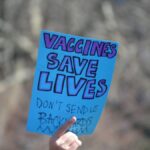As annoying as catching a cold may be, there could be a silver lining. New research suggests that it may temporarily protect you from getting covid-19.
Researchers revealed that individuals, especially children, who had recently been infected by a rhinovirus—the most frequent culprit behind the common cold—were remarkably less likely to get a SARS-CoV-2 infection, the virus that causes covid-19, in the following weeks. These results might shed light onto why children have lower chances of developing covid symptoms than adults.
An ‘early advantage’
“Our findings suggest that the immune boost from a recent cold may give the body an early advantage in fighting SARS-CoV-2 before it has a chance to take hold,” Max Seibold, Director of the Regenerative Medicine and Genome Editing Program (REGEN) at National Jewish Health, said in a National Jewish Health statement. “This may help explain why children, who tend to get more colds than adults, generally experience fewer and less severe COVID cases.”
Seibold and his colleagues detailed their results in a study published earlier this month in The Journal of Infectious Diseases, after analyzing data that tracked over 4,100 people in 1,394 households from May 2020 to February 2021. They tested thousands of self-collected nasal swabs for SARS-CoV-2 and other common respiratory viruses, such as rhinovirus.
Built-in boost
Rhinoviruses trigger interferons—natural agents that fight against infection and diseases—in our airways. This reaction can give the immune system a temporary boost, leaving it better equipped to handle other viruses that show up. In fact, to further investigate how recent viral infections impact the body’s antiviral defenses, the team also studied gene expression (when genetic information is translated into a function) in people’s airways and found children had a higher baseline expression of genes related to interferons than adults.
“Based on these findings, we hypothesize that interferons induced by prior viral respiratory infections may prime the airways of children with high levels of antiviral defense proteins, resulting in reduced levels of SARS-CoV-2 infection and better clinical outcomes compared to adults,” the researchers explained in the study.
This phenomenon, known as heterologous viral interference, “has been observed for other respiratory viruses, but has yet to be demonstrated for SARS-CoV-2,” the scientists added.
Camille Moore, lead author of the study and a biostatistician at National Jewish Health, explained that “understanding how one virus can affect the body’s response to another could help us develop new prevention strategies, especially for vulnerable populations,” she said in the statement.
Moore also clarifies that this doesn’t mean people should start trying to catch a cold. And if you think that’s an obvious warning, you clearly don’t know humans very well.
Read the full article here












